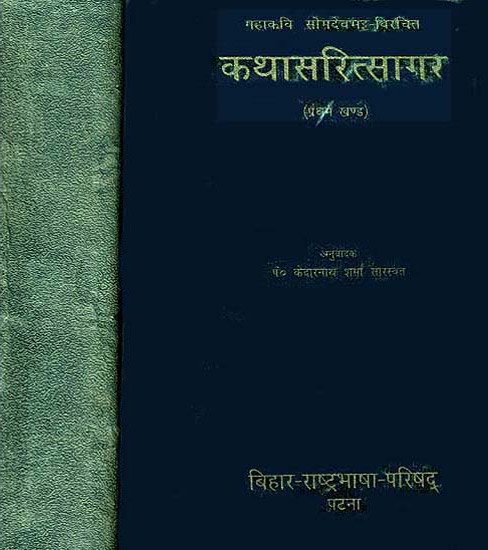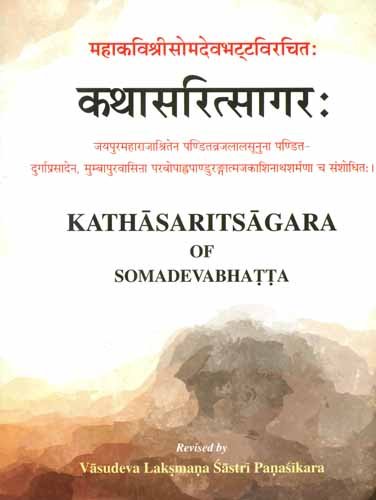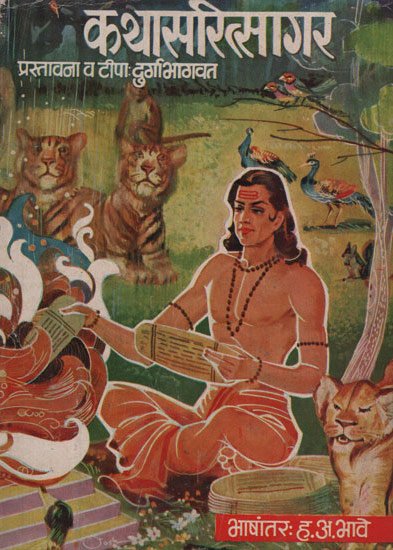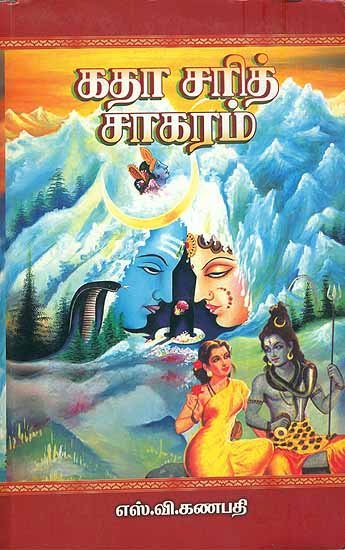Kathasaritsagara [sanskrit]
by C. H. Tawney | 2014 | 226,424 words | ISBN-13: 9789350501351
The Sanskrit edition of the Kathasaritsagara referencing the English translation and grammatical analysis. Written by Somadeva and dating from the 12th century, the Kathasaritsagara (or Katha-sarit-sagara) represents an epic legend narrating the adventures of Naravahanadatta as he strives to become the destined emperor of the Vidyadharas. Alternative titles: (Kathāsaritsāgara, कथासरित्सागर, Kathā-sarit-sāgara)
Verse 9.2.126
तत्र व्याघ्रमृगक्रोडान् ससैन्ये राज्ञि निघ्नति ।
अधावन् कुपिताः सिंहाः श्रुतवारणबृंहिताः ॥ १२५ ॥
tatra vyāghramṛgakroḍān sasainye rājñi nighnati |
adhāvan kupitāḥ siṃhāḥ śrutavāraṇabṛṃhitāḥ || 125 ||
The English translation of Kathasaritsagara Verse 9.2.126 is contained in the book The Ocean of Story by C.H. Tawney. This book is available online or you could buy the latest edition:
Read online Buy now! The English translation by C.H. Tawney (2014)
Glossary of Sanskrit terms
Note: This extracts Sanskrit terms and links to English definitions from the glossary, based on an experimental segmentation of verse (9.2.126). Some terms could be superfluous while some might not be mentioned. Click on the word to show English definitions.
Tatra, Vyaghra, Ric, Akra, Sasainya, Rajan, Rajni, Nighnat, Kupita, Simha, Shruta, Varana, Brimhita,
Analysis of Sanskrit grammar
Note: this is an experimental feature and only shows the first possible analysis of the Sanskrit text (Kathasaritsagara Verse 9.2.126). If the system was successful in segmenting the sentence, you will see of which words it is made up of, generally consisting of Nouns, Pronouns, Verbs, Participles and Indeclinables. Click on the link to show all possible derivations of the word.
- Line 1: “tatra vyāghramṛgakroḍān sasainye rājñi nighnati ”
- tatra -
-
tatra (indeclinable adverb)[indeclinable adverb]tatra (indeclinable correlative)[indeclinable correlative]tatra (indeclinable)[indeclinable]
- vyāghram -
-
vyāghra (noun, masculine)[adverb], [accusative single]vyāghrā (noun, feminine)[adverb]
- ṛg -
-
ṛc (noun, feminine)[compound], [adverb], [nominative single], [vocative single]
- akro -
-
akra (noun, masculine)[nominative single]
- ḍān -
-
ḍa (noun, masculine)[accusative plural]
- sasainye -
-
sasainya (noun, masculine)[locative single]sasainya (noun, neuter)[nominative dual], [vocative dual], [accusative dual], [locative single]sasainyā (noun, feminine)[nominative dual], [vocative single], [vocative dual], [accusative dual]
- rājñi -
-
rājñī (noun, feminine)[adverb], [vocative single]rājan (noun, masculine)[locative single]
- nighnati -
-
nighnat (noun, masculine)[locative single]nighnat (noun, neuter)[locative single]
- Line 2: “adhāvan kupitāḥ siṃhāḥ śrutavāraṇabṛṃhitāḥ ”
- adhāvan -
-
√dhāv (verb class 1)[imperfect active third plural]√dhāv (verb class 1)[imperfect active third plural]
- kupitāḥ -
-
kupita (noun, masculine)[nominative plural], [vocative plural]kupitā (noun, feminine)[nominative plural], [vocative plural], [accusative plural]√kup -> kupita (participle, masculine)[nominative plural from √kup class 4 verb], [vocative plural from √kup class 4 verb], [nominative plural from √kup class 10 verb], [vocative plural from √kup class 10 verb]√kup -> kupitā (participle, feminine)[nominative plural from √kup class 4 verb], [vocative plural from √kup class 4 verb], [accusative plural from √kup class 4 verb], [nominative plural from √kup class 10 verb], [vocative plural from √kup class 10 verb], [accusative plural from √kup class 10 verb]
- siṃhāḥ -
-
siṃha (noun, masculine)[nominative plural], [vocative plural]siṃhā (noun, feminine)[nominative plural], [vocative plural], [accusative plural]
- śruta -
-
śruta (noun, masculine)[compound], [vocative single]śruta (noun, neuter)[compound], [vocative single]√śru -> śruta (participle, masculine)[vocative single from √śru class 5 verb]√śru -> śruta (participle, neuter)[vocative single from √śru class 5 verb]
- vāraṇa -
-
vāraṇa (noun, masculine)[compound], [vocative single]vāraṇa (noun, neuter)[compound], [vocative single]
- bṛṃhitāḥ -
-
bṛṃhita (noun, masculine)[nominative plural], [vocative plural]bṛṃhitā (noun, feminine)[nominative plural], [vocative plural], [accusative plural]√bṛh -> bṛṃhita (participle, masculine)[nominative plural from √bṛh], [vocative plural from √bṛh]√bṛh -> bṛṃhitā (participle, feminine)[nominative plural from √bṛh], [vocative plural from √bṛh], [accusative plural from √bṛh]√bṛh -> bṛṃhita (participle, masculine)[nominative plural from √bṛh], [vocative plural from √bṛh]√bṛh -> bṛṃhitā (participle, feminine)[nominative plural from √bṛh], [vocative plural from √bṛh], [accusative plural from √bṛh]
Other editions:
Also see the following editions of the Sanskrit text or (alternative) English translations of the Kathasaritsagara Verse 9.2.126
Kathasaritsagar
by Kedarnath Sharma Saraswat (2005)
The Only Edition with the Sanskrit Text and its Hindi Translation (An Old and Rare Book) Set of 3 Vol.
Buy now!
Kathasaritsagara of Somadeva Bhatta (Sanskrit Text Only)
by Vasudeva Laksmana Sastri (2013)
Katha Sarit Sagar in Marathi
by H. A Bhave (1995)
Set of 5 Volumes; Published by Varada Books, Pune. 2256 pages (Throughout B/W Illustrations).
Buy now!
Katha Sarit Sagara (Tamil)
by S. V. Ganapati (எஸ். வி. கணபதி) (2014)
[கதா சரித் சாகரம்] Published by Alliance Publications.
Buy now!
Galpa Shono
by Abhijit Chattopadhyay (2014)
[গল্প শোনো] Galpa Shono: Bengali Translation of 'Suno Kahani From Katha Sarit Sagar'; 9788126015436; Published by Sahitya Akademi, Delhi.
Buy now!Preview of verse 9.2.126 in Bengali sript:
তত্র ব্যাঘ্রমৃগক্রোডান্ সসৈন্যে রাজ্ঞি নিঘ্নতি ।
অধাবন্ কুপিতাঃ সিংহাঃ শ্রুতবারণবৃংহিতাঃ ॥ ১২৫ ॥
![Kathasaritsagara [sanskrit] - book cover](/uploads/a/Katha-Sarit-Sagara.jpg)




